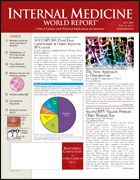Publication
Article
Internal Medicine World Report
Asthma Not Controlled in More than 50% of All Patients
Author(s):
Educate Patients on How to Respond to Severe Attacks
By David Wild
J Allergy Clin Immunol
Physicians are prescribing appropriate therapy for asthma, but in more than half of all patients, the asthma attacks are not under control, according to a new survey study, suggesting that physicians may need to improve their instructions to patients on how to respond to severe attacks. Level of education was the only variable that significantly correlated with the degree of asthma control (. 2007;119:1454-1461).
The study included a nationally representative sample of 1812 patients who had been diagnosed with moderate-to-severe asthma at least 1 year before study outset and were receiving standard asthma therapy. The majority of the patients were receiving treatment from a primary care physician.
All the patients had used at least 2 courses of oral steroids in the previous year, and most patients were using a short-acting beta-agonist in combination with at least 2 long-term controllers at the time of study. None had emphysema or chronic bronchitis.
Asthma was well controlled in only 45% (n = 809) of the patients, compared with 55% (n = 1003) of patients whose disease was uncontrolled. More than 85% of patients in both groups had healthcare coverage. The groups were comparable in terms of type of coverage and in physician specialty.
P
P
However, patients with uncontrolled asthma were more likely to have not completed college than those with controlled asthma ( = .003). And comorbid illnesses were significantly more common among patients with uncontrolled asthma. Specifically, 30.7% of patients with uncontrolled asthma had gastroesophageal reflux disease, 29.9% had chronic sinusitis, and 32.6% had borderline-significant high blood pressure, compared with 22.3%, 22.9%, and 26.2% for the 3 illnesses, respectively, among patients with controlled asthma ( <.05 for all).
P
Notably, 54% of patients with uncontrolled asthma and 37.9% of those with controlled illness reported having at least 1 asthma attack that caused them to fear for their life in the year before the study ( <.001). According to lead investigator Stephen Peters, MD, PhD, of the Department of Internal Medicine, Wake Forest University School of Medicine, Winston-Salem, NC, better patient education would lessen the impact of asthma on patient's lives.
"These results highlight the importance of providing patients with clear information on how to respond to a severe asthma attack," said Dr Peters. "Written asthma action plans have been associated with decreased emergency department visits, fewer hospitalizations, and improved lung function."
Can Respir J
In an unrelated editorial on asthma control (. 2007;14:229234), asthma expert Richard Hodder, MD, echoed Dr Peters' assertion. A patient-tailored "action plan" would mitigate the impact of what he believes is the dominant cause of poor asthma control—medication nonadherence.
"Probably the biggest impediment to achieving superior control over asthma at the moment is nonadherence with effective and readily available asthma management strategies, and both patients and healthcare professionals must share the blame," writes Dr Hodder, professor of medicine, Divisions of Pulmonary and Critical Care Medicine, The Ottawa Hospital, Ottawa, Ontario.
"Action plans reduce the likelihood of unintentional nonadherence (forgetting) by providing clear written guides for medication use, both when asthma is well-controlled and when symptoms escalate."





